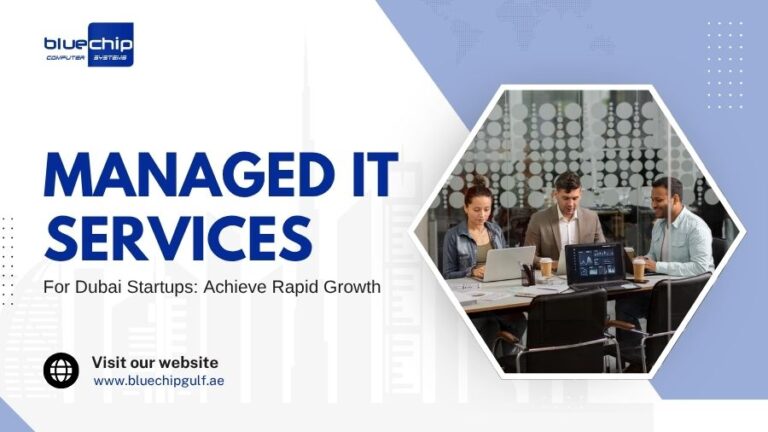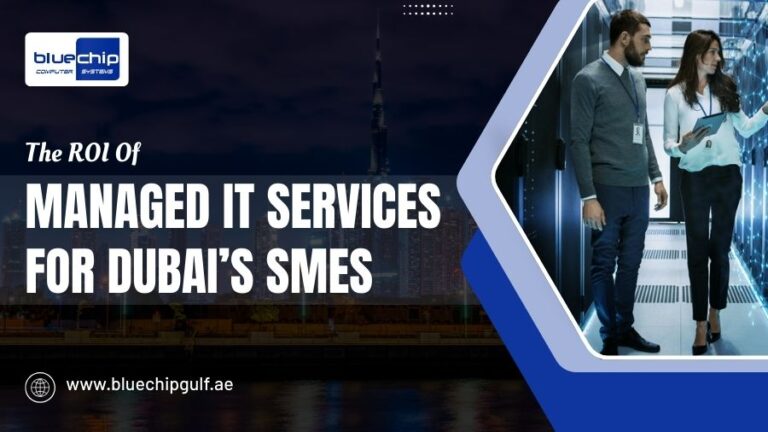
Managed IT Services vs. In-House IT: Which Is Right For You?
Organizations in Dubai must make the crucial choice of whether to hire and retain an internal IT staff or work with a specialized provider in the quickly changing business environment of today. Both strategies have unique benefits and drawbacks, and the best option will rely on a number of variables, including your IT environment’s complexity, budget, strategic objectives, and compliance needs. With an emphasis on how Bluechip Dubai can assist you in making the best choice, we will examine the main factors to be taken into account when deciding between in‑house IT and Managed IT Services in Dubai.
Table of Contents
Steps to Choose Between In-House IT vs. Managed Services in Dubai
1. Defining In‑House IT vs. Managed Services

An internal group of IT specialists who work directly for your company is referred to as “in-house IT.” Typical duties include –
- Daily support (desktop management, help desk)
- Network management (firewalls, switches, and routers)
- Maintenance of servers and infrastructure (private cloud or on-premises)
- Custom integrations and software development
- Monitoring of security and compliance
On the other hand, managed IT services in Dubai entail contracting with an outside vendor to handle all or a portion of your IT operations. For a fixed monthly fee, these providers offer a variety of services, including network management, cloud hosting, security, help desk, and strategic IT consulting.
2. Cost Considerations

In‑House IT
- Pay and Benefits – It can be costly to hire qualified IT workers in Dubai. Industry surveys indicate that the annual salary (including benefits) for a mid-level network engineer can vary between AED 150,000 and AED 250,000.
- Recruitment and Training – Locating competent applicants and delivering continuous training can result in substantial overhead costs.
- Equipment and Tools – Capital budgets may be strained by the cost of purchasing and maintaining enterprise-grade hardware and software licenses.
Managed Services
- Pricing Predictability – The majority of providers, including Bluechip Dubai, provide flat monthly fees along with tiered service packages. This lowers unforeseen costs and makes budgeting easier.
- Economies of Scale – Managed service providers (MSPs) can bargain for lower prices on hardware, software licenses, and cloud services by distributing resources among several clients.
- No Recruiting Difficulties – You save money and time by not having to hire, train, and retain specialized IT personnel.
3. Access to Expertise and Latest Technologies

In‑House IT
- Deep Organizational Knowledge – Internal teams are aware of the specific technical environments, business procedures, and company culture.
- Possible Skill Gaps – Considering the complexity of contemporary IT, from cloud architectures to cybersecurity, it can be difficult to assemble a fully staffed team with specialists in each field.
Managed Services
- Specialized Skill Sets – Networking, cybersecurity, cloud platforms (AWS, Azure, Google Cloud), and adherence frameworks (ISO 27001, GDPR, PDPL) are among the specialized skill sets that trustworthy MSPs employ.
- Continuous Training – To guarantee access to the newest best practices and technologies, vendors make significant investments in continuing certification and training. For example, Bluechip Dubai keeps engineers up to date on new platforms and threats through a training program.
4. Scalability and Flexibility

In‑House IT
- Restricted by Headcount – Prolonged hiring cycles are frequently necessary when scaling up for a new project or unexpected expansion.
- Reactive Resourcing – Even if your staff is underutilized during slow times, you are still responsible for paying all of their salaries.
Managed Services
- Elastic Capacity – To adapt to shifting demands, MSPs can quickly deploy more staff, such as engineers for a migration project or the creation of new cloud infrastructure.
- Flexible Service Tiers – You can make sure you only pay for what you use by modifying service levels as your company expands or changes.
5. Focus on Core Business vs. IT Administration

In‑House IT
- Operational Focus – Your leadership needs to devote a lot of time to strategy, problem-solving, and IT staffing.
- Distraction from Core Objectives – Managing a whole IT department can take focus away from developing new products, providing customer support, and growing the market for non-IT companies.
Managed Services
- Strategic Partnership – Your senior management can focus on growth initiatives and core competencies by outsourcing IT administration to Managed IT Services in Dubai.
- Proactive Roadmapping – To match IT investments with organizational strategy, MSPs frequently incorporate technology roadmaps and quarterly business reviews into their services.
6. Risk Management and Security

In‑House IT
- Variable Security Posture – Threat detection, incident response, and compliance monitoring may be compromised in smaller teams due to a lack of specialized security professionals.
- Limitations of Incident Response – Handling a security breach necessitates constant attention to detail and proficiency in forensic analysis, which may be beyond the capabilities of an internal team.
Managed Services
- 24/7 Monitoring and SOC – Top providers run Security Operation Centers (SOCs) that conduct vulnerability assessments, keep an eye out for threats, and react to incidents instantly.
- Compliance Assurance – Top MSPs maintain strong compliance programs because they cater to a variety of industries and geographical areas. This ensures that your data handling complies with international standards like ISO 27001 and UAE standards like the PDPL.
7. Customization and Control

In‑House IT
- Complete Control – Without being limited by vendors, internal teams can quickly implement unique solutions, integrations, and process modifications.
- Risk of Silos – In-house procedures may become antiquated or deviate from industry norms in the absence of external validation.
Managed Services
- Standardized Best Practices – To lower the possibility of human error, MSPs codify tried-and-true procedures for patch management, disaster recovery, and change management.
- Tiered Control Options – Reputable providers deliver governance dashboards, fine reporting, and fixed account managers to remain visible and in control, even if you give up some day-to-day management.
Making the Decision – Key Questions to Ask

What are your long-term IT objectives?
Do you intend to enter new markets, undergo digital transformation, or expand quickly? Aggressive growth might be better supported by flexible managed IT services in Dubai.
Is it possible to find and keep specialized talent?
Hiring network engineers, cloud architects, and cybersecurity analysts can be challenging, but outsourcing to Bluechip Dubai guarantees access to a wealth of knowledge.
How important are monitoring and uptime around the clock?
A managed services model with SOC support provides greater assurance than a standard in-house team if your operations require non-stop availability.
What level of predictability do you require in your budget?
The flat-fee structure of managed services helps organizations with strict budgeting by preventing unforeseen capital expenditures.
Do you require assistance with audits and compliance?
Audits, reporting, and certification procedures can be made simpler by collaborating with an MSP knowledgeable about UAE regulations.
Hybrid Approaches – Best of Both Worlds
Some companies choose a hybrid model, outsourcing regular operations and specialized functions to an MSP while keeping a small in-house IT staff for strategic oversight and vendor management. This method enables –
- Strategic Ownership – Maintain command over important architectural choices and vendor connections.
- Operational Efficiency – Assign professionals to handle patch management, help desk assistance, and security monitoring.
- Cost optimization – Strike a balance between fixed managed services fees and full-time employee costs.
Why Partner with Bluechip Dubai?

Bluechip Dubai, a top supplier of managed IT services in Dubai, provides –
1. Broad Range of Services – From cloud migrations and unified communications to network administration and endpoint security.
2. Proven Track Record – Assisting customers in the manufacturing, healthcare, education, and finance sectors.
3. Local Expertise – Comprehensive understanding of regional threat landscapes, data sovereignty requirements, and UAE regulations.
4. Customer-centric approach – Transparent SLAs, real-time reporting dashboards, and committed account teams.
Choosing Bluechip Dubai as your managed services partner gives you a strategic ally dedicated to coordinating technology with your business goals while guaranteeing innovation, compliance, and resilience.
Conclusion
There is no one-size-fits-all solution when it comes to selecting between Managed IT Services in Dubai and in-house IT in Dubai. It necessitates a thorough assessment of the objectives, financial limitations, risk tolerance, and resource availability of your company. Reliable operations, strong security, and the flexibility to adjust to new challenges should always be the top priorities, regardless of whether you choose a hybrid arrangement, an internal team, or fully outsourced managed services.
Your decision-making process can be streamlined by working with Bluechip Dubai, which can clarify the best IT model for your business and provide the know-how to implement it successfully. The proper IT strategy is not only an operational decision, but also a competitive advantage in a time when technology supports every aspect of business.
Also Read: DLP For Dubai’s Education Sector: Protecting Research And Student Data








